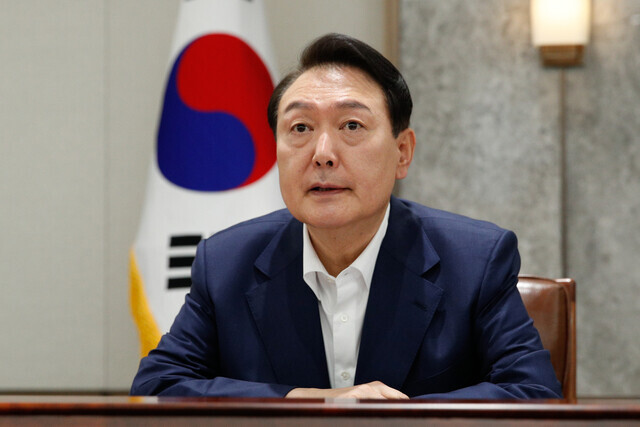hankyoreh
Links to other country sites 다른 나라 사이트 링크
Yoon Suk-yeol’s approval rating drops to 37%

South Korean President Yoon Suk-yeol’s job performance approval rating continues to slide.
Results on Monday showed Yoon with an even lower approval rating than the ruling People Power Party (PPP).
The presidential office is facing a deepening quandary as it struggles to deal with the various warning signals it faces amid an onslaught of damaging factors including the withdrawals of Cabinet nominees, controversy over the hiring of acquaintances in the presidential office itself, an economic crisis, the resurgence of COVID-19, and internal strife within the president's own party.
A Realmeter survey of 2,252 South Koreans 19 and older nationwide on July 4–8 showed 37% evaluating Yoon’s job performance as “good” and 57% saying the president’s performance was “poor.” The survey had a 95% confidence level and a margin of error of plus or minus 2 percentage points.
The latest survey showed positive assessments down by 7.4 percentage points and negative ones up by 6.8 percentage points compared with a previous round of polling in the fifth week of June. Even among respondents aged 60 to 69, who are considered staunch supporters of conservative parties like the PPP, negative ratings outnumbered positive ones by a margin of 48.2% to 46.3%.
Compared with the previous week, positive ratings were down by 12.9 percentage points among respondents in their 20s, 10.7 percentage points among supporters of the PPP, and 9.6 percentage points in the traditionally conservative-leaning Daegu/North Gyeongsang region. The numbers point to major losses among Yoon’s core support base.
The same survey showed the PPP earning a 40.9% party support rating, compared with 41.8% for the opposition Democratic Party — putting the latter in front for the first time in the 14 weeks since a previous survey for the fifth week of March. At that time, Yoon led his own party in support; the latest results showed the reverse.
Another survey by the Korea Society Opinion Institute showed 34.5% of respondents rating Yoon positively and 60.8% rating him negatively. Polling 1,002 adult respondents on July 8–9, the survey had a 95% confidence level and a margin of error of plus or minus 3.1 percentage points.
“The drop in Yoon’s support rating is a reflection of both the appointment issue and his attitude in response to that issue,” said Park Sung-min, president of MIN Consulting.
“It reads as a warning from his existing support base, including conservatives and males in their 20s and 30s,” he concluded, adding that Yoon will “need to acknowledge the public’s criticisms and choose an agenda that suits the domestic and international situation.”
The presidential office views the reasons for the drop in Yoon’s approval rating as stemming externally from economic factors with inflation, high oil prices, and the high exchange rate, and internally from discord in the PPP.
“We’re focusing on efforts and messaging management to overcome the economic crisis,” an official in the presidential office told the Hankyoreh.
“We hope the party can effectively resolve the current situation,” they added.
Another official in the presidential office said, “The approval rating has a huge impact on the president’s leadership, so we are watching attentively and considering ways of helping to boost it.”
As of Monday, the presidential office temporarily suspended Yoon’s informal press conferences on his way to work, which had become a target of controversy due to his unpolished responses. The reason given was the need to preventively reduce Yoon’s contact with reporters after numerous COVID-19 cases emerged among the presidential office press corps.
With the president’s approval rating slipping, the presidential office appears to be using the resurgence of COVID-19 as an opportunity to work on managing its messaging.
By Kim Mi-na, staff reporter
Please direct questions or comments to [english@hani.co.kr]

Editorial・opinion
![[Editorial] Penalties for airing allegations against Korea’s first lady endanger free press [Editorial] Penalties for airing allegations against Korea’s first lady endanger free press](https://flexible.img.hani.co.kr/flexible/normal/500/300/imgdb/original/2024/0502/1817146398095106.jpg) [Editorial] Penalties for airing allegations against Korea’s first lady endanger free press
[Editorial] Penalties for airing allegations against Korea’s first lady endanger free press![[Editorial] Yoon must halt procurement of SM-3 interceptor missiles [Editorial] Yoon must halt procurement of SM-3 interceptor missiles](https://flexible.img.hani.co.kr/flexible/normal/500/300/imgdb/child/2024/0501/17145495551605_1717145495195344.jpg) [Editorial] Yoon must halt procurement of SM-3 interceptor missiles
[Editorial] Yoon must halt procurement of SM-3 interceptor missiles- [Guest essay] Maybe Korea’s rapid population decline is an opportunity, not a crisis
- [Column] Can Yoon steer diplomacy with Russia, China back on track?
- [Column] Season 2 of special prosecutor probe may be coming to Korea soon
- [Column] Park Geun-hye déjà vu in Yoon Suk-yeol
- [Editorial] New weight of N. Korea’s nuclear threats makes dialogue all the more urgent
- [Guest essay] The real reason Korea’s new right wants to dub Rhee a founding father
- [Column] ‘Choson’: Is it time we start referring to N. Korea in its own terms?
- [Editorial] Japan’s rewriting of history with Korea has gone too far
Most viewed articles
- 160% of young Koreans see no need to have kids after marriage
- 2Presidential office warns of veto in response to opposition passing special counsel probe act
- 3[Editorial] Penalties for airing allegations against Korea’s first lady endanger free press
- 4Months and months of overdue wages are pushing migrant workers in Korea into debt
- 5Anti-immigration candidate marauds across Korea with squad detaining foreigners
- 6Hybe-Ador dispute shines light on pervasive issues behind K-pop’s tidy facade
- 7[Reporter’s notebook] In Min’s world, she’s the artist — and NewJeans is her art
- 8Inside the law for a special counsel probe over a Korean Marine’s death
- 9Japan says it’s not pressuring Naver to sell Line, but Korean insiders say otherwise
- 10Alleged drug use by Korean A-listers rocks nation – but not for the first time